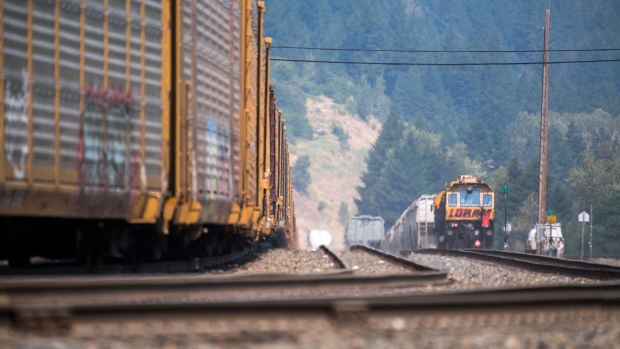Jul 6, 2021
B.C. fires halt hundreds of rail cars, creating export bottleneck
, Bloomberg News

Hundreds of rail cars have been halted by wildfires that damaged tracks in western Canada during the region’s severe heat wave, creating a bottleneck of exports and delaying imports.
A fire that burned down a village in British Columbia last week damaged two nearby tracks operated by Canadian Pacific Railway Ltd. and Canadian National Railway Co., the two companies that account for the bulk of train transportation to the country’s biggest port in Vancouver. Grains, lumber, containers and other goods move along these lines.
It’s the latest hit to supply chains after a year full of snarls that have ranged from a global container shortage to a six-day blockage of the Suez Canal in March. Transportation problems have increased the cost of everything from gasoline to bread and, at times, threatened to leave stores short of key goods.
Canadian miner Teck Resources Ltd. warned that it expects steelmaking coal sales to drop by 300,000 to 500,000 metric tons in the third quarter because it was forced to reroute shipments north to Prince Rupert, British Columbia.
In an email to customers, Hapag-Lloyd AG said rail line damage has caused a berth delay for vessels at the Vancouver port. Delays of 72 hours to 96 hours are expected, as well as a large backlog.
Canadian Pacific said late Monday that it had resumed mainline rail operations following safety inspections, but Montreal-based Canadian National still needs to repair its bridge near Lytton, B.C., the village that was largely destroyed by fire last week.
The shutdown of the CN line means the disruption of as many as 30,000 barrels a day of crude that are normally shipped through Vancouver for refineries in the Pacific Northwest, according to a person familiar with operations. The Parkland refinery in Burnaby, B.C., also has received crude and biofuel feedstocks via rail.
In a 48-hour period, more than 4,000 Canadian Pacific and Canadian National cars loaded with grains were idled in Canada, more than triple the daily average a week ago, data from the Ag Transport Coalition show.
“The increased counts in recent days are a direct reflection of the mainline outages experienced by CN and CP west of Kamloops due to the wildfires, most notably at Lytton, BC.,” the coalition said in a report Tuesday. Recovery will be slow, the group warned. “It is not unreasonable to think a return to ‘normal’ could take weeks.”
Canada’s other west coast port in Prince Rupert, just south of the Alaska Panhandle, has seen an increase in grain rail cars being unloaded there, with more scheduled to arrive. A Canadian Pacific train arrived in Vancouver on Tuesday with 200 cars, indicating some level of operations have resumed. There are 250 cars waiting near Kamloops, B.C., and 550 near the provincial boundary between Alberta and B.C., Ag Transport said.
‘Ghost Town’
The long disruption means “we’re talking thousands of containers stuck in transit. If you drive by CN yard, it is a ghost town and it’s just plugged with containers,” said Tom Johnson, spokesperson for Port Transport Association, a group of about 35 trucking companies that handle containers coming to Vancouver by rail and sea.
“What a lot of carriers have done is they have stopped their intermodal unit in Calgary, and then they are trucking from Calgary to Vancouver,” Johnson said. “People don’t realize the impact, and you’re going to see the impact in the stores if these trains don’t start moving in Vancouver.”
The halted rail cars are affecting the movement of everything from lumber to grains to plastic, said Jordan Atkins, vice-president at WTC Group Inc., a transloading company near the Vancouver port.
WTC hasn’t received any new cargo via rail for two to three days and is making arrangements to have some items transported by truck from Alberta, he said.
“Just when we thought we were finding a new normal, there’s yet another ripple effect that’s going to reverberate through the B.C. west coast,” Atkins said.





